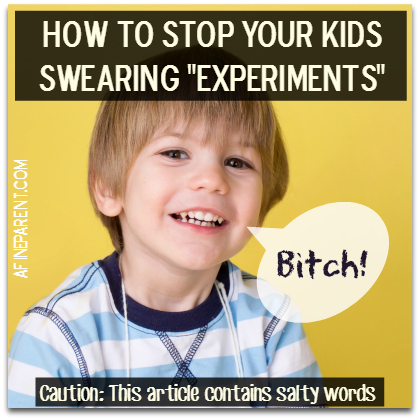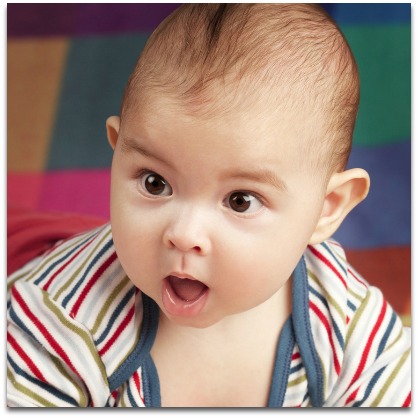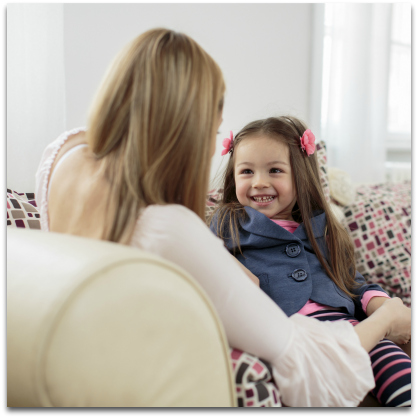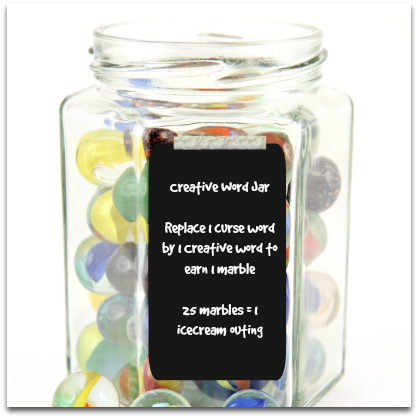 (Caution: This article contains salty words)
(Caution: This article contains salty words)
“Bitch!”
The shock I feel when I hear my sweet little child swear never quite goes away.
Who said that? I think, still jolted off balance. Where did he learn that kind of language anyway?
In our case it was the tram: a treacherous place where my children are receiving their first exposure to the Real World.
In our urban Swiss lifestyle, our ride to school comes complete with teenagers making their way to the English language high school. It makes me cringe every time I hear a high schooler drop some “colorful metaphors”. I always look at my children to see if they are listening.
And, of course, they always are.
Swearing. Curses. Profanities. Obscenities. Vulgarities. Expletives. Everyone uses them at some point. Some people have perfected the art of speaking complete sentences made entirely out of expletives. Comedians thrive on the titillation they create with salty language.
Our society is fascinated with swearing. From explicit lyric labels to FCC regulations, it seems we spend a great deal of energy thinking about colorful language.
Is swearing ever okay, though?
Studies have shown that when you drop an F-bomb or two after smacking your shin against the coffee table you actually experience less pain. Swear words are also highly effective for expressing strong feelings. “Jerk!” doesn’t quite have the same punch of emotion as “Asshole!”
However, in both examples above, the relief or release felt is lesser for someone who uses expletives all the time than for someone who hardly ever does. And the company you’re in determines whether the repercussions of swearing are worth the temporary relief. So, it does pay to be judicious with your swearing.
People also swear as part of mastering a language.
Think about all the babbling your child did as a baby. Amongst all the cute cooing and babbling they began making meaningful connections between those sounds and objects around them. Suddenly mamamama became Mama!
Once they mastered the vocabulary, they began to understand nuances like irony and sarcasm. Then came experimentation with alternative meanings to words. And in the final phase of developing linguistic mastery, we hear swearing.
Understanding the nuances of swearing, when and where it is acceptable, is a crucial part of becoming indoctrinated into a culture and developing maturity. Because its taboo, kids swear with peers whom with they feel safe. Swearing with friends is a sign of acceptance and equal standing within the group.
So ok, hard as it is for me to admit as a parent, there is a time and place where swearing might be okay.
But I definitely don’t want my kids swearing experiments to turn into a habit.
What can I do? Here’s what I’ve found helps –
#1 Plan Ahead
 I have started to believe that half of parenting is controlling my own knee-jerk reactions to the stuff my boys do and having a plan for what to do instead.
I have started to believe that half of parenting is controlling my own knee-jerk reactions to the stuff my boys do and having a plan for what to do instead.
My oldest son said his first curse word at 1 year old. I was parking and I accidentally tapped my husband’s car. Before I knew it, the word shit came flying out of my mouth.
And then from behind me, with perfect articulation, an angelic little voice says, “Shit!”
I had not planned for this, but one year of parenting had already taught me I shouldn’t react. There was no way he knew what he had said and if I reacted, I knew I’d be teaching him that “that word” was worth repeating. Instead, I laid my head on the steering wheel and silently prayed to whatever deity was handy that he would never repeat that in public.
Children are in tune to your reactions. When I react, I teach my boys they have the power to influence the world around them. Therefore, it’s important I figure out how I want to react when they first start swearing.
I am constantly running different scripts through my head. What if he says X? Hmmm… Maybe I should say Y. That way I don’t have to think on my feet and hope I magically come up with an ideal response. (Side Note: You know the “2-Minute action plans” that Sumitha has us writers put at the end of each article? This is what they’re meant for! So if you really want to get the most out of your time here, never skip them action plans!)
Also, work towards recognizing your own “reaction gap”. Victor Frankl, an Austrian neurologist, psychiatrist, and Holocaust survivor, advises we find the space between the action, in this case swearing, and the response, in this case our reaction to the swearing, and use that time shape the actual response. The faster you are at recognizing this “gap”, the more space you can create to shape your reaction.
In my case, I feel a tightening in my chest or some tension across my shoulders when I am starting to react. In someone else it may be a feeling or emotion that clues them in. Either way, learning your own signals will help you recognize when you need to fall back on your prepared plan instead of running with a spur-of-the moment response. This takes practice in being self-aware and interpreting the signals sent to your brain, but the effort pays off (not just as a parent, but in all aspects of life).
#2 Be Open
After an initial discussion about language, Evan came to me and asked, “What are all the words I shouldn’t be saying? And if there are words that you just don’t say, why do we say them at all?“
In his Seven Words You Can’t Say on TV, George Carlin complains, “Nobody even tells ya when you’re a kid what the words are that you’re supposed to avoid! You have to say them to find out which ones they are.” That was sure true when I was a kid!
While it’s true that your toddler probably doesn’t need to know anything more than “That’s not a nice word,” your tween is going to want to know more. Why isn’t it nice? What does it really mean? Do you ever swear???
One evening at dinner, Evan asked us what “bitch” meant. After my husband picked up the fork he had dropped, we sat down with him and told him everything. All the words. And we gave him the real definitions in a very matter-of-fact way.
Bitch = Female Dog. Shit = Poop. Fuck = Having sex.
Evan was amused and mystified. Why would someone want to call someone else a female dog? Having sex (in the mind of a 10-year-old) is weird. And poop is much funnier to say than shit.
Giving him the real definitions and being open to answering all his questions took away some of the power and mystique of swearing. Our matter-of-fact attitude took away a lot of his desire to experiment.
#3 Give Reasons Why We Don’t Swear
 Words have power. Words can lift you up and words can tear you down. Tony Robbins, a life coach and motivational speaker, says that the words you consistently use in your everyday life can even shape how we think and feel.
Words have power. Words can lift you up and words can tear you down. Tony Robbins, a life coach and motivational speaker, says that the words you consistently use in your everyday life can even shape how we think and feel.
Calling an experience “miserable” makes that experience miserable. Calling it “an adventure” transforms the experience in your mind and re-colors it. Firing out bitch as an insult to someone ripples through and colors their entire day’s experience in a damaging way.
Evan and I also had a conversation about the flip side of this: that the words he chooses to use also colors how other people see him.
People judge you. It’s a fact of life. Evolution has hard-wired us to make judgments and assumptions about others. Our brain processes cues such as what others wear, how they behave, and what they say to categorize people as threats or non-threats. We aren’t even conscious about it!
Share with your children how you judge others who swear regularly. I explained to Evan, “When I hear other people swear it makes me believe that they might be violent or angry, or they might be insecure within and trying too hard to seem cool, or they don’t have a very big vocabulary.”
I selected these reasons because I knew that they would resonate with Evan. He is very proud of and likes to show off his large vocabulary and always wants to be seen as friendly. Saying what I think of those who use those kinds of words gives him an internal incentive not to swear.
#4 Be an Example
There is a reason “monkey see, monkey do” is an age-old adage. Children copy their parents. They play dress up in our old suits and pretend to go to work. They play house and imagine they are the mom or dad. I constantly hear my own words come out of Henry’s mouth.
Heck! I still hear my own mother’s words come out of my mouth!
Language experts say that children who hear their parents curse often internalize the words and incorporate them into their own language patterns.
And how can we tell them “We don’t use language like that,” or “Those words aren’t nice,” when we use them ourselves? If there is one thing children can sniff out like little bloodhounds, it is hypocrisy.
We’ve cleaned up our language a fair amount since we had kids. It happened very organically without really giving it too much thought. But every once in a while, when I am agitated or frustrated, I am caught by surprise by a swear word making an unscheduled re-appearance – like in the case of my mini car accident above.
To prevent a sense of hypocrisy during such incidents, we encourage our kids to point out when we use bad language. It creates an environment of equality. It’s much easier to enforce limits or enjoy rewards when we hold each other equally accountable.
#5 Creative Choice Awards
 As I noted above, words shape our experiences. We can still express our thoughts and emotions without resorting to swearing.
As I noted above, words shape our experiences. We can still express our thoughts and emotions without resorting to swearing.
My mother, for example, was fond of shouting “Apple!” or “Kumquat!” when she was frustrated. Just thinking about the word “kumquat” makes me giggle. The absurdity of shouting “KUMQUAT!” after dropping an egg on the floor still gives that explosive release of tension and exchanges the shock for humor.
We’ve all heard about the Swear Jar, where each family member has to drop in a quarter when they use a swear word. Penalizing methods can work, but as with any punishment, there are loads of bad feelings around them and resentments can build up. All that resentment can result in rebellion and more swearing!
Instead, try a Creative Word Jar. We put in a quarter every time we hear the boys resist the urge to utter a curse word and use creative words instead. The more creative and funnier the better! I got the idea from listening to all the words Shakespeare has masterfully twisted together to form some of the best non-swearing insults of all time.
For example, we have Shakespeare to thank for the wonderful adjective “lily-livered.” Think of all the wonderful metaphors your brilliant child can create!
This also calls attention to and praises the efforts they are making not to swear. It tells them that you notice and shows it matters to you. Take the money at the end of the year, month, or even week, and spend it on a family outing or special reward that the whole family can agree on.
In the end, our kids have to decide what words they will use to color their experiences. The color of their world will depend on the language habits they have formed as children. The choices, therefore, when to use swear words should be conscious ones and not one simply determined by the force of habit.
The 2-Minute Action Plan for Fine Parents
Take a quick couple of minutes to think through the following questions.
- Is swearing a problem in your household?
- How often do you swear?
- How often do you hear your kids and their friends swear?
- How do you react when you hear your kids (or their friends) swearing?
- How do you want to react? What do you want to teach them?
The Ongoing Action Plan for Fine Parents
In the long run, think about the kind of language choices you want your child to make and what kind of speech patterns you want them to have as adults.
- Think through and then have a conversation with your child about their language and the language that they probably hear used around them. What do they notice? How do they feel about it?
- What can you do to change your own language so that you are the one teaching them positive and creative self-expression? Have them think through their own alternative words.
- Consider if a reward system is right for you. A Creative Word Jar can be a fun and positive activity for modifying our not-so-positive language.


This is a positive approach. I appreciate your post. Parenting is about connecting with the emotional need of the child. You also contact with our adviser.
My kids are pretty sensitive and polite, and not particularly interested in shocking me, so I don’t think they’d have been that attracted to swear words even before I told them they could use them. They knew them all from YouTube videos–I just pointed out which ones they shouldn’t say in front of small children or adults who would be upset. The hardest one to explain was not to use “God” in the wrong context because some people get really weird about it.
We did have a long discussion, though, about using words in general, and how it’s intention that matters. You can hurt people far more with perfectly acceptable words. Would you rather hear someone say to your kid “You are so ugly and stupid you don’t deserve to live” or “Hey, you are f–king awesome!”?
In terms of the walls, I have seen that lecture. It’s really inspiring. (The only part of that talk that bugged me was purposely ruining the upholstery in the new car so people would relax in it, because as someone who makes things I have a problem with some destruction. If someone lopped off a piece of a violin I worked hard on to make themselves less nervous about using it I would be mad.) My mom painted a mural in our bathroom when I was a kid, complete with constellations on the ceiling. It’s beautiful, but even if it weren’t there’s nothing on walls you can’t just paint over if you don’t like it. I think my kids just don’t want to be locked into anything. They don’t like change, so they wouldn’t easily undo something they made.
You’ve got a good point… you can indeed hurt people a lot more with perfectly acceptable words, and “swear” words can indeed brighten up someone’s day sometimes! With my daughter though, I don’t think I can stop at telling her which words shouldn’t be said in front of small children or adults who would be upset… she will want all the more to find out herself. I still remember when she was young (and even now to a certain extent), she would tap her head against a wall just to see how it actually feels when we say “watch out, you’ll get hurt if you bang your head by accident.” It makes me equal parts proud and frustrated to see her intentionally trying (gingerly, but trying nevertheless) something that I know (and have told her!) will hurt… Oh well!
And I don’t remember the part of the video where he talks about purposely ruining the upholstery! It’s been a while since I saw the full video though… I think the parts that stuck with me were (a) the acknowledgment that parents did play a (huge) role in making “a life well-lived” possible and (b) by gosh, when it’s time for me to go, I hope I can go with my head held high knowing I’ve done (or at least tried to do) all that I wanted to!
Your daughter would make an excellent scientist. And, really, if she tests those things and discovers consistently you are right, then in the long run she will trust you more anyway. It’s better she know you’re worthy of being listened to than going on blind faith.
What a wonderful thought/perspective to start the day with. Thank you, Korinthia 🙂
I am a teacher and I love reading your pieces of advice because most of these things also happen at school. I am going to take your ‘swearing jar’ idea , but change it a little and use it here at school. We hear LOTS of swearing , but we do understand that they are experimenting and trying to impress, so I am always reminding them that they can be more creative with their vocabulary since they are in Middle School now and have become such good readers and speakers. This usually works well, but I have some ideas how to use this jar in a positive way. Let me work it out and then I’ll let you know how it works.
I am so glad that you are going to try the Creativity Jar in your classroom. I am even more excited that you are going to report back on how effect it is. The boys were able to afford gelato every day during our vacation to Rome. 🙂
Thanks for the kind words, Molly. And I am so excited that you are going to try this in your classroom! Yes, please do let us know how it goes… I’d love to share it with the rest of the AFP community.
Malinda, I don’t know which one I am more jealous of – your kids being creative enough to earn so many gelatos, the gelatos themselves or the vacation in Rome! My sister is in Rome right now and having a blast… and out here in Austin we’re have some of the gloomiest days ever. *Sigh!!!*
What we’ve told our kids is that swearing is kind of superstitious. There is no reason why one word that means poop should be different from another word that means the same thing, and yet we’ve decided one is okay and one is bad. The only words we’ve explained are bad are the ones specifically designed to hurt people, such as racial slurs, and even those it depends on the context to some degree.
My husband and I almost never swear. I find it lazy. It also reduces the effect of those words, so on the rare occasion I do swear, people are stunned, which is satisfying. If I did it all the time no one would care, so what’s the point?
I told the kids early that swear words are shocking to certain people, so if they want to use them they have to be aware of their impact. They have complete permission to swear at home if they choose, because I don’t care. As a result the words have no appeal, so my children don’t bother. I remember once when my oldest was about four some project she was working on accidentally fell and was destroyed and she yelled “damn it!” and honestly, I was impressed that she used it in the proper context. I don’t think I’ve heard her do it since.
(I also try to convince my kids to draw on their walls because they are good artists and I think that would be great, but they won’t do it. It’s not really reverse psychology, because I really do want them to do certain things other parents are bothered by, but the impact of parental approval is interesting.)
You sound like a friend of mine. They taught their kids to swear, but they also taught them that people in public don’t like it. I like your casual attitude. And if they ever do draw on the walls and do some murals I totally want to see. It does sound cool.
You’re crazy, Korinthia (and I mean that in the nicest way :))
My daughter hasn’t really started experimenting with swearing yet (beyond variants of “poop”), but I know it is only because she really hasn’t come across any real curse words yet. She goes to a private school where things are a little more sterile than public schools, hasn’t had a chance to go on public transport like Malinda’s kids and my husband and I hardly ever swear these days. I’m waiting to see how she deals with it when she does come across swear words. My money is on her not being able to resist experimenting with them every which way she can 🙂
About drawing on the walls, have you watched Randy Pausch’s Last Lecture? Every time someone mentions allowing kids to draw on the walls, it reminds me of that talk… I’m not brave enough to give my daughter open reign like you, but am thinking of making it a birthday gift for her one of these years…. pick a wall and turn it into a project for her and me to work on together. I think it will be kind of cool for us to plan together, draw/shop for stencils, and then color it in on evenings and weekends…
PS: If your kids do draw on the walls, I’m with Malinda…. I want to see them!!!
(Whoops, I accidentally replied to this below! Sorry about that.)